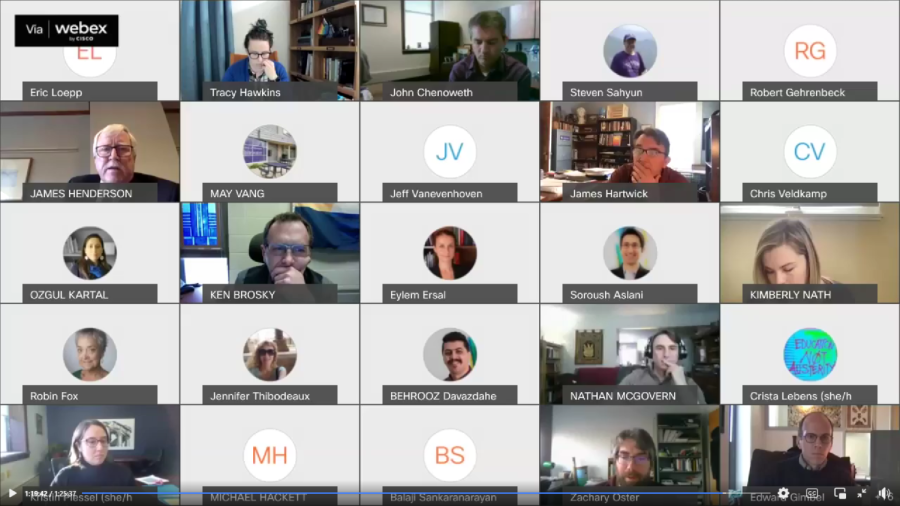Faculty Senate talks COVID mandates and more
January 23, 2022
With much debate about how to improve the way faculty deals with the ongoing COVID-19 pandemic, the Faculty Senate meeting on Jan. 18 was packed full of different issues and points of view.
“Omicron is spreading and it is a real challenge,” said Interim Chancellor Henderson. “And as we have in the past, we’re still looking at guidance from Walworth and Jefferson county health departments, from our own health center director, CDC, all of that. I think that we need to be very careful, and also I think this is another good reason why all the effort that went into trying to get students and staff vaccinated to the fullest extent possible. Hopefully that will serve us well as we go forward.”
There was much debate about what mandates they may want to consider keeping, but also if the mandates had the effect or outcome they wanted at all.
Tracy Hawkins started the topic about how faculty needs to improve how they collect feedback from and about supervisors. She not only presents a PowerPoint on how they can improve this but further goes into detail about how department chairs can start becoming better leaders.
“The chair is in some real ways the supervisor of the academic staff and the ADA. Meaning that the chair has a lot of control over whether or not the academic staff and the ADA continue to be employed,” Hawkins.
Furthermore, others spoke up about how it should be a priority that everyone has a voice when giving feedback.
“I just want to emphasize Tracy did an awesome job overall, but we want to focus on this as an opportunity for everyone on campus to be able to give feedback and in some manner rather than,” said Brenda Johansen. “An opportunity you know, this is a formative, open-ended place for all the students that were given employment opportunities on campus, all of our GAs, all of our university staff to make sure that every single person who’s employed on campus can give this feedback. I think the opportunity to have a voice is really the overarching goal of this.”
Assistant professor Eric Loepp made it a point to circle back to how they do course evaluations. There have been different approaches over time to how this is done. Some ways are more effective than others to different senate members, but they got to vote on their top choices for how to go about evaluations. It transitioned into how more available resources and mindfulness could lead to better outcomes for different students on campus as well as better evaluations for staff and courses.
“Other key things that were noted in the survey is that a lot of students identify themselves as using campus resources such as CSD, also, more students of LGBTQ backgrounds,” said associate history professor Kimberly Nath. “So, I think that is very significant and we should probably have conversations too about resources and meeting the needs of our students based on how they’re identifying and also what they’re using on campus. I also would note one other kind of final thing and then I’ll stop talking is that students are noticing that they’re kind of less outgoing or less discussion based in classes and that could be directly correlated with the pandemic. So, I think that’s something we should be cognizant of moving forward, kind of the impacts of social isolation and literal social distancing over the last few years.”
On top of different proposals being approved, there were a large number of updates and movements in different departments and programs. They made it a point that these programs and departments should be recognized and not forgotten as well as learning communities shouldn’t be forgotten.
There were many other issues and topics brought up as well such as professor Sharon Kolb being awarded the Emeritus status and more. Different resolutions are taking place and being prepared to help faculty do their jobs better. There was also talk from Chancellor Henderson about the budget, chancellor updates, and other job positions that have had changes like the Vice Chancellor for Administrative Affairs being taken over by Jeff Arnold.
Finally, the Faculty Senate wrapped up their agenda by bringing up that the university is up to 20 faculty searches for next year.














